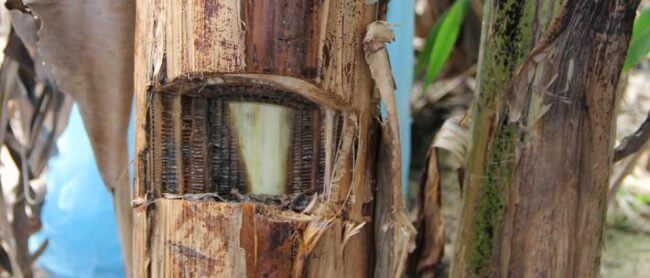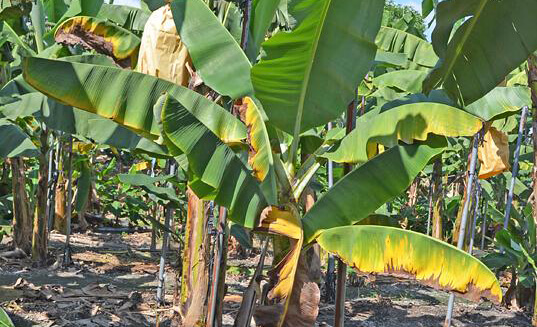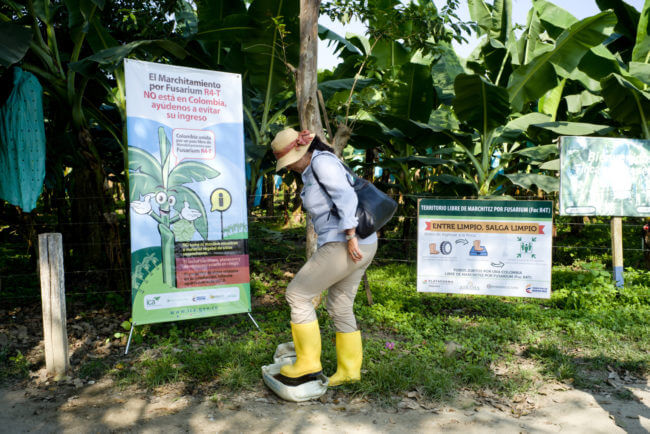BananEx is three year, £1.2 million interdisciplinary project on the resilience of the banana supply chain led by Exeter University.
(TR4)
Home » Our Projects » BananEx (TR4)
The UK is highly dependent on imported fruit and vegetables that make up eighty per cent of the market, compared with half of cereals and one sixth of meat and dairy produce. Yet, fruit and vegetables are a key component of a healthy diet, often overlooked in studies of global food security that tend to focus on the major grains.
Reliance on imports makes the UK vulnerable to instabilities in international production and supply, placing the issue of resilience of the UK food system firmly in a global context. This vulnerability is epitomized by the banana, the most popular fruit in the UK by consumption, and the most important fruit in the world by production.
Though hundreds of banana varieties are grown around the world for domestic consumption, only one variety, Cavendish, is internationally traded. The previous export variety, Gros Michel, was eliminated by Panama Disease in the 1950s, and now a new virulent strain, Tropical Race 4 (TR4), is emerging from Asia to threaten the Cavendish. No alternative tradable varieties are available, and no chemical disease controls exist. If TR4 reaches Latin America and the Caribbean, supply to the US and EU will collapse.

The vulnerability of the banana trade is an extreme case of the more general issue of imported crops that are vulnerable to emerging pests and diseases, for example citrus greening disease devastating oranges in Florida and California. Around the world efforts are underway to develop a resistant export banana variety, using both conventional breeding and genetic modification, as well as research into disease detection and alternative methods of control.
However, the banana remains under-researched compared with the major crops, there has been little academic analysis of the resilience of the banana trade nor development of mitigation strategies to maintain supply or manage the impact of sudden catastrophe.

In this multidisciplinary research programme, we will work with the UN FAO World Banana Forum (WBF) to collate detailed data on production levels, disease impacts, and mitigation methods.
We will analyse patterns, trends and drivers of banana production, including pests, diseases, management, and climate, to provide robust models of production and how this could vary in future as diseases spread and the climate changes. We will test a new antifungal compound against TR4, to determine whether chemical control could mitigate production impacts while alternative resistant varieties remain under development.
We will develop an economic model that characterizes the main features of the UK value chain, forming the basis for assessing the price transmission impacts following shocks in upstream markets and, by extension, the impact on UK consumers and the responses by UK food retailers and other market intermediaries.
We will calibrate the theoretical framework and simulate the impact of projected production shocks in exporting countries on UK consumers, and derive the welfare impact for participants at each stage of the value chain.
The banana market is politically sensitive, and over the past decade the price of bananas in the UK has declined, while production costs have increased, placing pressure on producers.
Via the WBF, the UK charity Banana Link and the food sector consultancy 3Keel we will engage the UK retail sector and other stakeholders in rigorous key informant analysis of potential responses to vulnerabilities in the sector, impacts of prices rises on the UK consumer, feedbacks to producers, and strategies to improve resilience to production shocks.
Our goal is to secure the future of the UK’s favourite fruit, and provide a case study for improving the resilience of other vulnerable imported commodities.

Necessary cookies are absolutely essential for the website to function properly. This category only includes cookies that ensures basic functionalities and security features of the website. These cookies do not store any personal information.
Any cookies that may not be particularly necessary for the website to function and is used specifically to collect user personal data via analytics, ads, other embedded contents are termed as non-necessary cookies. It is mandatory to procure user consent prior to running these cookies on your website.